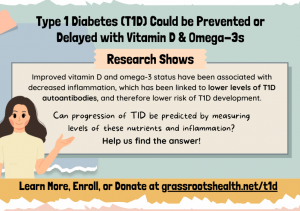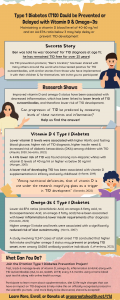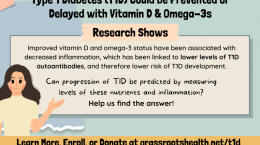Published on June 11, 2024
Help increase awareness of research to demonstrate how the diagnosis and progression of diabetes among children and adults can be greatly affected by vitamin D and omega-3 status
Key Points
- We are looking for individuals and organizations to join our volunteer marketing team to help bring awareness to the role of vitamin D and omega-3s in delaying or preventing type 1 diabetes (T1D) and who can share about this study and its enrollment with those who may qualify
- T1D is an autoimmune disease that has historically been thought of as a childhood-onset disease, hence referred to as ‘juvenile onset’ diabetes; however, a 2022 review by Harding et al. demonstrated that the incidence of adult-onset T1D (among those 20 years or older) is substantial and is often misdiagnosed as type 2 diabetes
- The D*action T1D Prevention protocol including vitamin D and omega-3 fatty acids has now been shared with many others around the world who have tested positive for the T1D autoantibodies, and we are receiving similar stories from those who have implemented it with their children, and for themselves. We now invite anyone who shares this experience, or who would like to give this protocol a try, to become part of our T1D Prevention Study.
 This summer we will be focusing more on our Type 1 Diabetes (T1D) Prevention project!
This summer we will be focusing more on our Type 1 Diabetes (T1D) Prevention project!
We are looking for individuals and organizations to join our volunteer marketing team to help bring awareness to the role of vitamin D and omega-3s in delaying or preventing T1D (such as in the success story here), and who can share about this study and its enrollment with those who may qualify.
Are you or someone you know involved in the T1D community? Do you work with individuals who have T1D or are at risk for and/or concerned about getting T1D? Take a look at the study slide set here, and share the research below!
The protocol used in the D*action T1D Prevention Study has already been implemented by many others and has seemed to help delay or prevent a diagnosis of T1D, even after testing positive for the T1D autoantibodies. We now invite anyone who shares this experience or who would like to give this protocol a try to become part of the study, so that we can measure, track, and publish the findings to help make this an officially recognized protocol in the scientific journals – and more likely to be discovered, shared, and accepted.
Email [email protected] if you are interested in helping to market this project and the research behind it.
Thank You, and Onwards to Better Health!
The GrassrootsHealth and Children with Diabetes Research Foundation Team
Posts to Read and Share
New Studies Show Significant Effects of Vitamin D on Beta Cell Function
 In most individuals with Type 1 Diabetes (T1D), insulin secretion declines as time progresses after diagnosis. However, residual insulin secretion has been observed among 10-30% of those with T1D, even 30-50 years after diagnosis. This indicates what is called Residual Beta Cell Function (RBCF). In fact, an estimated 30-50% of beta cell function remains at time of T1D diagnosis.
In most individuals with Type 1 Diabetes (T1D), insulin secretion declines as time progresses after diagnosis. However, residual insulin secretion has been observed among 10-30% of those with T1D, even 30-50 years after diagnosis. This indicates what is called Residual Beta Cell Function (RBCF). In fact, an estimated 30-50% of beta cell function remains at time of T1D diagnosis.
Residual beta cell function (and residual insulin secretion) can be determined by measuring circulating C-peptide levels in response to a meal (called the stimulated C-peptide response). C-peptide is a molecule that is released by the pancreas when it makes insulin; the lower the C-peptide level, the less insulin is being produced.
A study among participants who had been living with T1D for about 10 years found that those who retained a stimulated C-peptide response had significantly lower levels of HbA1c (showing better blood sugar control), a 65% lower risk for severe hypoglycemia, and a 50% reduced risk of retinopathy progression compared to those who did not have a C-peptide response. It has also been shown that those who had better glycemic control and retained higher beta cell function during the first few years after diagnosis were more likely to maintain beta cell function decades later.
A recent systematic review found a strong association between lower vitamin D levels and the development and diagnosis of T1D, with “high-level evidence that adequate vitamin D status in early life reduces T1D risk.” Another study showed that the T1D children who were supplemented with vitamin D had lower levels of fasting blood glucose (FBG), mean blood glucose (MBG), HbA1c, and mean total daily insulin dose (TDI); these findings overall indicate a protective effect of vitamin D on residual beta cell function.
Learn more about this latest research showing how beta cell function and the progression of type 1 diabetes can be greatly affected by an individual’s vitamin D status and by their ratio of fatty acids AA to EPA.
Type 1 Diabetes Could be Prevented or Delayed with Vitamin D & Omega-3s
 T1D is an autoimmune disease that has historically been thought of as a childhood-onset disease, hence referred to as ‘juvenile onset’ diabetes. However, a 2022 review by Harding et al. demonstrated that the incidence of adult-onset T1D (among those 20 years or older) is substantial and is often misdiagnosed as type 2 diabetes.
T1D is an autoimmune disease that has historically been thought of as a childhood-onset disease, hence referred to as ‘juvenile onset’ diabetes. However, a 2022 review by Harding et al. demonstrated that the incidence of adult-onset T1D (among those 20 years or older) is substantial and is often misdiagnosed as type 2 diabetes.
Whether discussing the research on type 1 or type 2 diabetes, evidence has shown that maintaining a vitamin D blood level of 40-60 ng/ml (100-150 nmol/L) and an AA:EPA ratio below 3 may help delay or prevent the development of either, likely due to the roles of vitamin D and omega-3s in managing inflammation and regulating the immune system.
A protocol involving education, measurement of, and supplementation with vitamin D and omega-3s is now being implemented to help decrease the progression of T1D among those at risk. Take action for yourself or someone you know who may be concerned about Type 1 Diabetes. Share this information with them today!
Learn More About the Research Here
Can Type 1 Diabetes be Prevented? Help Us Find the Answer
T1D is recognized as an autoimmune disorder, triggered when antibodies created by a person’s own immune system (autoantibodies) attack the cells of the pancreas. These T1D islet cell autoantibodies are associated with the development of T1D, and their presence can be used as markers of the process that can cause type 1 diabetes. Improved vitamin D and omega-3 status have been associated with decreased inflammation, which has been linked to lower levels of T1D autoantibodies, and therefore lower risk of T1D development.
Learn More About the T1D Prevention Study and Enroll Here
What Can You Do?

Join the D*action Type 1 Diabetes Prevention Project, or Share with Someone You Know by Downloading the Infographic Today!
As part of this project, a home blood spot test kit will measure
- Vitamin D
- Omega-3 Index with AA:EPA and Omega-6:Omega-3 Ratios
- HbA1c
- hs-CRP (a marker of inflammation)
- T1D Autoantibodies (IAA, IA-2A, GAD65, ZnT8)
Test, track & manage levels of vitamin D, omega-3s, inflammation and HbA1c along with T1D autoantibody levels every 3-6 months along with online health surveys. Learn about supplementation, diet, and life-style changes that can have an impact on T1D diagnosis.
Order Your Test Kit & Enroll Here
Are You Interested in Sponsoring a Participant?
The fees associated with the testing in this program (3 test kits over a span of approximately 18 months, at a cost of $315 plus shipping per kit) may not be affordable for everyone interested, and we highly encourage donations to help sponsor participation. Can you sponsor a qualifying participant in the study? Even sponsoring a single test kit could make a big difference for someone at risk.
Are You Getting Enough Vitamin D, Omega-3s & Other Important Nutrients?
 Having and maintaining healthy vitamin D levels and other nutrient levels can help improve your health now and for your future. Choose which to measure, such as your omega-3s and essential minerals including magnesium and zinc, by creating your custom home test kit today. Take steps to improve the status of each of these measurements to benefit your overall health. You can also track your own intakes, symptoms and results to see what works best for YOU.
Having and maintaining healthy vitamin D levels and other nutrient levels can help improve your health now and for your future. Choose which to measure, such as your omega-3s and essential minerals including magnesium and zinc, by creating your custom home test kit today. Take steps to improve the status of each of these measurements to benefit your overall health. You can also track your own intakes, symptoms and results to see what works best for YOU.
Enroll and test your levels today, learn what steps to take to improve your status of vitamin D (see below) and other nutrients and blood markers, and take action! By enrolling in the GrassrootsHealth projects, you are not only contributing valuable information to everyone, you are also gaining knowledge about how you could improve your own health through measuring and tracking your nutrient status, and educating yourself on how to improve it.





